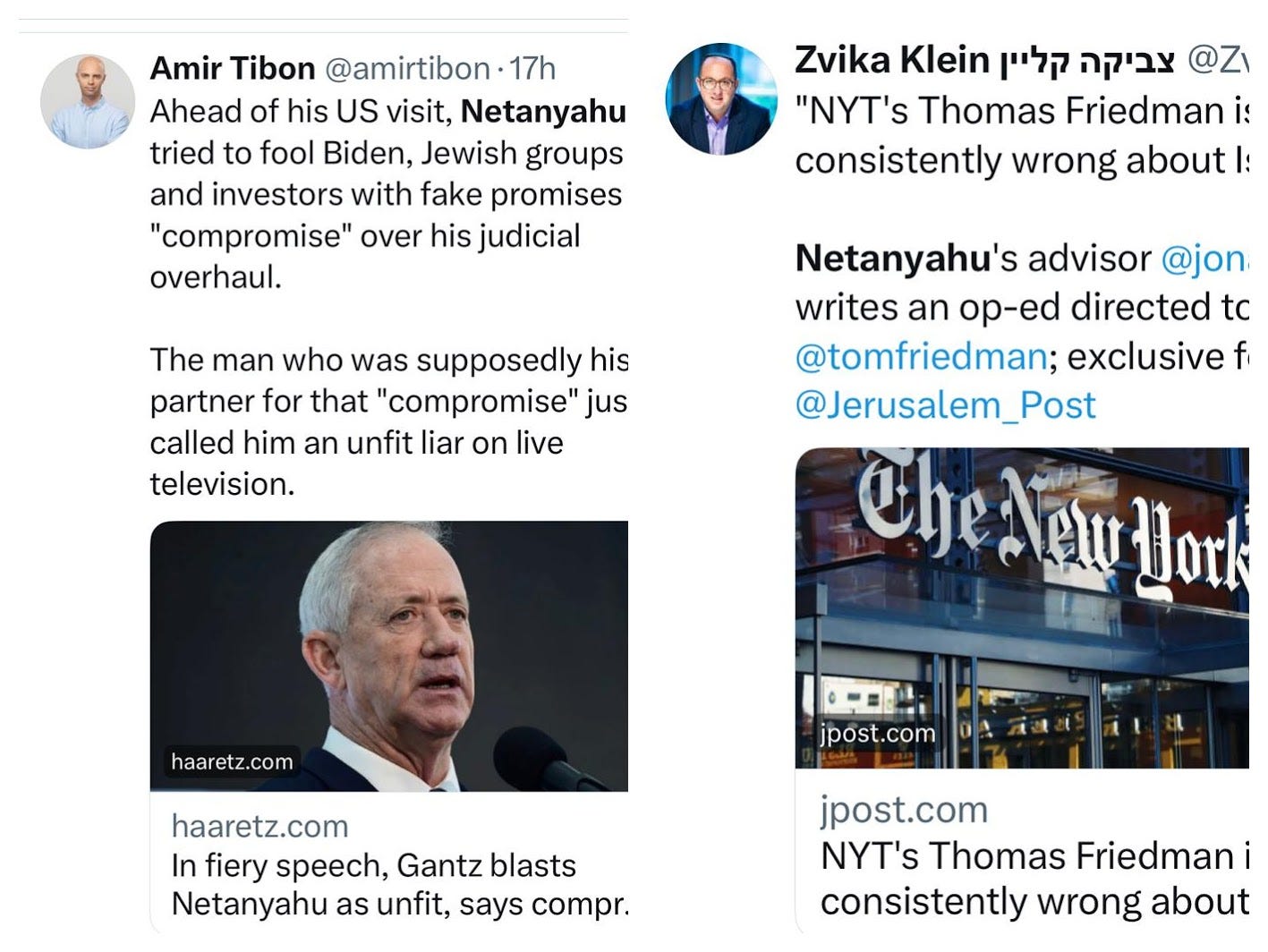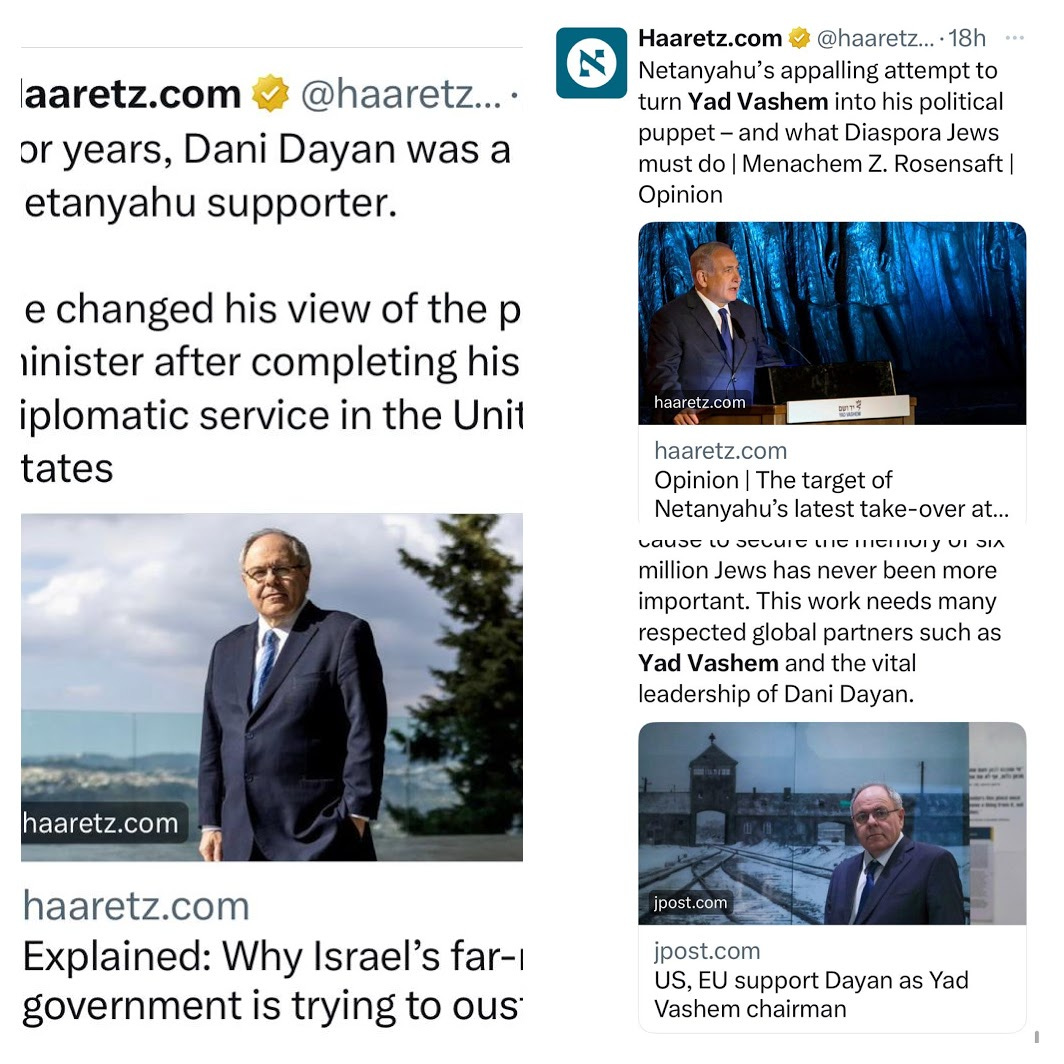1. Judicial Overhaul: Attempts to Reach a Compromise Between Coalition and Opposition, while Getting Closer to the Tipping Point of a Clash Between Supreme Court and the Government
Breaking news earlier this week revealed an attempt, led by the President of Israel, to reach an agreed upon document that reflects a compromise in terms of the changes in the judicial system. In the paper, PM Netanyahu agreed to freeze all new bills for the judicial overhaul, reverse the last bill on the elimination of the reasonableness doctrine and other items on the table. But due to the fact that this was exposed, all the major stakeholders have already announced that this document is not acceptable. Among them was the minister of justice, one of the main architects of the judicial overhaul, other members of the PMs party, Likud, and other coalition partner party leaders from the extreme-right.
In a few days, the High Court of Justice will convene, in a full board of all fifteen justices to discuss a petition that demands the cancellation of the last amendment that revoked the reasonableness doctrine. There are strong and loud voices from the coalition threatening the Supreme Court not to rule for a cancellation, since the amendment was passed as a basic law, which is the foundation of the future constitution of Israel, and basic laws are traditionally not subject to court review. PM Netanyahu called on the opposition to come to the table and open talks to reach an agreement, but no one trusts him any more and there was no response to all his requests.
Meanwhile, speaker of the house (Israeli Knesset) announced that the Knesset will not align with any ruling that undermines its status, arguing that the court has no authority to nullify basic laws. A basic law is one which is labeled as such but only needs 61 votes out of 120 to be legislated, revoked or amended.
The protest against the judicial overhaul continues unabated. The police estimated recently, that in the last seven months, since the minister of justice announced the judicial overhaul, at least seven million Israelis have participated in the protests.
It is also important to say here, that the former head of Israel’s Mossad, Tamir Pardo, gave an interview to the AP News agency. When he was asked about the events in the occupied Palestinian Territories (OPT), he replied, in a rare and brave statement that a reality in which two populations that live in the same territory and each is subject to a different set of laws, is known as Apartheid. This is the first time that an Israeli official in such a high position has used this term.
2. A Severe Bloody Clash Between Police and Members of the Eritrean Community In Israel
The Eritrean Embassy in Israel was granted a permit from the police to organize a public event and celebration in support of their current dictator, Isaias Afwerki, who has ruled the country ruthlessly for 32 years. Opposing Eritreans came and started rioting against the supporters of the regime which soon turned bloody. Police forces who were trying to deal with the escalation found themselves in real danger and opened fire towards the demonstrators. Fifteen people were seriously wounded, including two policemen, and 170 others were wounded and needed medical treatment.
There are approximately 25,000 undocumented Africans in Israel, mainly from Sudan and Eritrea. Many of them claim they are political refugees, and cannot be deported back to their homeland. Israel has refrained thus far from investigating each case and concluding who is in danger and who can be sent back home. As a result there is a large community of undocumented Africans concentrated mainly in southern Tel Aviv. Right-wing politicians have expressed racist stances against those Africans, the most prominent of them is the minister of gender equality, May Golan, who grew up in southern Tel Aviv and made her way up the political ladder by expressing racist views against the African refugees.
PM Netanyahu attempted to advance a reasonable plan to deal with the Eritrean refugees, but was strongly and brutally pressured to cancel. The plan included granting residency and work permits to a few thousand migrants, but right-wing supporters claim that this will be a real threat to the Jewishness of the state, since if other Africans hear that Israel grants them residency, they will flood the country and we will lose the Jewish majority.
PM Netanyahu and his political partners want to take advantage of the event and deport everybody who participated in the riots. But they cannot do that, as Israel is a signatory to international conventions to protect political refugees.
3. Over 200 Students from the Oldest High-School in Israel Organized an Anti-Draft Event
A controversial event concerning the mandatory military draft for every eighteen year old in Israel, boys and girls, in the context of the judicial overhaul, was held at one of the most famous high-schools in the country, Herzliya Hebrew Gymnasium. The parents board banned the event that was organized by school alumni. The principle announced that if the event would be canceled or banned he would resign which he did. But the event was held regardless and the principal was convinced to retract his resignation which he did.
The draft is mandatory in Israel for boys and girls when they turn eighteen. But in the current context, with the judicial overhaul, and the plan of the government to exclude all Yeshiva boys, from the Orthodox Jewish community from the draft by law, there is a large and growing trend among the liberal community in the country claiming that the state has broken the unwritten social contract between the citizens and the state and they no longer wish to be part of the support for a dictatorship. Thus far, the refusal to continue serving was only among the reserve forces, but refusal to serve has started carrying over into eighteen year old soldiers to be.
4. Minister of Education Seeks to Oust Yad VaShem Chair
Minister of Education Yoav Kish (Likud) seeks to replace current Yad VaShem Chair, Danny Dayan, and has, for some time, been quietly working to replace the members of Yad Vashem's board of directors to control the organization. While the minister claimed that the intention to oust the current chair is due to “financial irregularities and complaints regarding maltreatment of employees, the media reported that the move was initiated by PM Netanyahu and his wife.
Danny Dayan was appointed chair of Yad VaShem by the previous government. Prior to that, he served as Israel’s consul general in NYC under the former Netanyahu government, and was chair of the Judea and Samarita Council, representing Jewish settlements in the West Bank.
As Chair of Yad VaShem, Dayan, albeit a settler himself, criticized Netanyahu’s government for forging relationships with far right, antisemitic and holocaust denying parties in East Europe, in exchange for their support of the settlements. This, according to the media, and the fact that Dayan invited a singer who took part in the women’s protest against the judicial overhaul, is what triggered the pressure to remove and replace him with a former member of Knesset from the Likud, Keren Barak.
However, the appointment committee rejected Kish’s nominee, and determined that there is a political connection between her and Minister Kish and that she does not have "special skills" as required in such cases.
Hundreds of holocaust researchers and several prominent holocaust museums voiced their concern over the intention to oust Danny Dayan and its implications for holocaust memorial efforts. They were joined by senior U.S. officials in charge of combating antisemitism and Holocaust denial in the call to maintain the independence of Yad Vashem.
5. Five Israeli Citizens Detained in Cyprus Over Allegations of Gang Rape of a British Tourist
Following a brief from the ministry of foreign affairs, the media reported that six Israeli citizens, aged nineteen and twenty, were detained and interrogated, after a twenty year-old British tourist filed a complaint of gang rape at a resort in Ayia Napa, Cyprus. One of the young men was released after the Cypriot police were convinced that he was not involved. The woman who filed the complaint told the police that she met two of the men at a pool party and was forcibly dragged to a room at the resort.
The Cypriot police reported that the detainees released videos of the alleged rape on social media. Their mobile phones were confiscated and they were detained in separate cells, to prevent them from coordinating their testimonies.
The ministry of foreign affairs said in the brief that they are in touch with the families of the detainees and with the Cypriot police, and that this is a “highly sensitive and complex case”.
This is the second time that a group of young men from Israel are suspected of gang rape in Cyprus. In July of 2019, twelve young men were detained over allegations of the gang rape of a British tourist. They were released shorty thereafter, and the young woman who made the complaint was later sentenced by a Cypriot court for filing a false complaint. This verdict was later overturned by the Cypriot supreme court.
For Further Reading:
Judicial Overhaul: Here, here, here, here, here










